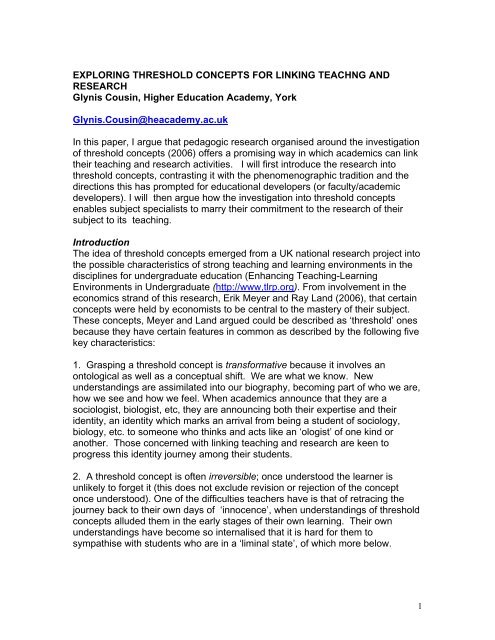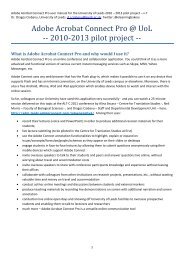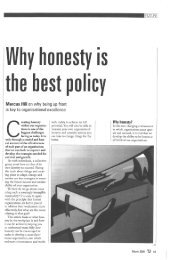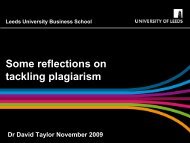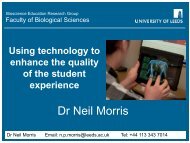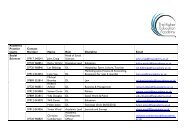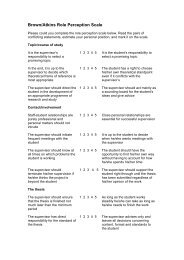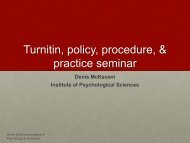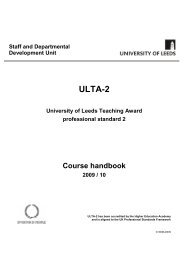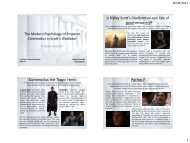Glynis Cousin. Exploring threshold concepts for linking teaching and ...
Glynis Cousin. Exploring threshold concepts for linking teaching and ...
Glynis Cousin. Exploring threshold concepts for linking teaching and ...
You also want an ePaper? Increase the reach of your titles
YUMPU automatically turns print PDFs into web optimized ePapers that Google loves.
ightly, educational developers have encouraged academics to complementcaring <strong>for</strong> their subject through good research <strong>and</strong> scholarship with caring <strong>for</strong>their students through good <strong>teaching</strong> practices but getting this dual care ethic tocross fertilise has proved to be much more difficult. Moreover, as anyoneinvolved in accredited teacher development courses knows, getting academics totheoretically underpin their reflections on their practice from educational theory isalways an uphill struggle, with most stopping <strong>for</strong> a permanent rest at mount Kolb.This is underst<strong>and</strong>able because subject specialists who are not social scientistsare being asked to become in<strong>for</strong>med amateurs in another discipline. Thresholdconcept research offers a way out of this problem because it squarely placessubject specialists at the centre of an inquiry into the difficulty of their subject. Inthis way, there is a restoration of dignity <strong>for</strong> academics <strong>and</strong> a reconfiguration ofthe relationships between students, academics <strong>and</strong> educational researchers <strong>and</strong>developers within a framework of ‘transactional curriculum inquiry’, as I discussbelow.I am not suggesting that phenomenographic research never involved subjectspecialists – such a suggestion would ignore the many educational studies bysubject specialists generated by this tradition. Indeed the entire SOTL(Scholarship of Teaching <strong>and</strong> Learning) movement generated by this tradition isabout interesting academics in pedagogic research. However, there are someimportant differences between the research framework <strong>for</strong> deep <strong>and</strong> surfacelearning (phenomenography ) <strong>and</strong> that of <strong>threshold</strong> <strong>concepts</strong> research (whichdoes not have a settled methodological framework). Phenomenography exploresstudent experiences <strong>for</strong> the discovery of variation in learners’ reported ways ofexperiencing phenomenon. Phenomenographic research is on the students sothat once extracted from them (often through interviews or surveys), the studentexperience data becomes the researcher’s text to analyse, heightening the risk ofthe students’ experience being represented through the researchers’ experienceof the students’ experience. In so far as all research findings are the product ofinterpretation of some kind, I would not want to claim that <strong>threshold</strong> conceptresearch escapes this problem entirely (indeed some <strong>threshold</strong> concept researchdraws heavily on this tradition) but there is an emergent trend in the research into<strong>threshold</strong> <strong>concepts</strong> that is apace with contemporary concerns about this kind ofinterpretive predicament.Threshold concept research offers a <strong>for</strong>m of transactional curriculum inquiry inthat all the key players (academics, students, educationalists) can work iterativelytogether to explore the difficulty of the subject. What seemed clear from some ofthe papers arising from a recent symposium on <strong>threshold</strong> <strong>concepts</strong>(Strathclyde,2006) is the dialogue <strong>threshold</strong> concept research can generatebetween subject specialists, students <strong>and</strong> educationalists. For instance, Osmond,Turner <strong>and</strong> L<strong>and</strong> write: (2006:12)Using <strong>threshold</strong> <strong>concepts</strong> as a framework has enabled the research team toopen up a dialogue with the staff in a discipline that appears, in the main, to be5
elatively under-theorised. This usefulness of the dialogue was evidenced duringthe whole-staff meeting <strong>and</strong> individual interviews by the enthusiasm of the staff toparticipate. (my emphasis)The subject in question is that of automotive design <strong>and</strong> the staff referred to areinternationally recognised as leading edge researchers in their field. Thedialogue referred to by the authors centred on an exploration of spatial literacy;while these researchers had intuitive, tacit knowledge of this capability, they hadnever been asked to articulate it as a group, to probe how it can be mastered <strong>and</strong>the potentially troublesome dimensions to it. Threshold concept research stagesthe educational debate at the scene of the subject <strong>and</strong> its difficulty, allowing theacademic to combine his expertise <strong>and</strong> commitment to his subject with aninterest in how best to teach <strong>and</strong> learn it. Another good example of this ‘openingup of a dialogue’ is in Orsini-Jones (2006) action-research on ‘crossing grammar<strong>threshold</strong>s’, where there is an impressive back <strong>and</strong> <strong>for</strong>th movement of inquiryfrom academic to student in the exploration of the difficulty of grammatical<strong>concepts</strong>. Orsini-Jones’ (2006) inquiry allowed the students to <strong>for</strong>mulate <strong>and</strong>surface their struggles to master grammatical constructions <strong>and</strong> <strong>for</strong> theacademics to <strong>for</strong>mulate <strong>teaching</strong> <strong>and</strong> learning activities that might support them,testing these iteratively with the students. My point here is that whereas theconvention in universities is to ask students to evaluate the quality of their<strong>teaching</strong> <strong>and</strong> learning support, the drift of <strong>threshold</strong> concept research is to sharean inquiry into the difficulty of their subject with the academics.In recent years, I have given a number of presentations on <strong>threshold</strong> <strong>concepts</strong> toacademics; these usually involve an interactive moment in which I askacademics to think about possible c<strong>and</strong>idates <strong>for</strong> <strong>threshold</strong> <strong>concepts</strong> in theirdiscipline. There is always animated discussion following this request. I think thisis because I am asking academics to deconstruct their subject rather than, say,their practice (at least in the first instance) <strong>and</strong> this is both safe <strong>and</strong> interestingterritory. I suspect that such a deconstruction can also serve to refresh theacademic’s underst<strong>and</strong>ing of his own subject, as it seemed to do with theautomotive designers referred to above, though this needs further research.To conclude, I have argued that the search <strong>for</strong> <strong>threshold</strong> <strong>concepts</strong> has thepotential to open up discussions among subject specialists, students <strong>and</strong>educational researchers, creating <strong>for</strong>ms of transactional curriculum inquirybetween these three parties. Further, I have argued that <strong>threshold</strong> conceptresearch does not require the academic to learn another discipline; on thecontrary, it requires that she goes more deeply into her own <strong>for</strong> the purposes of<strong>for</strong>mulating the best ways of <strong>teaching</strong> <strong>and</strong> learning it, By staging the explorationat the site of the subject <strong>and</strong> of its difficulties, <strong>threshold</strong> concept researchpromises to harness an academic’s research curiosity <strong>for</strong> his subject with a newcuriosity about how best to teach it; this promise carries with it an enhancedcapacity <strong>for</strong> research <strong>and</strong> <strong>teaching</strong> to be dynamically linked.6
ReferencesBrew A (2006) Research <strong>and</strong> Teaching: Beyond the Divide, Palgrave, London<strong>Cousin</strong> G (2006) Threshold <strong>concepts</strong>, troublesome knowledge <strong>and</strong> emotionalcapital: an exploration into learning about others in Meyer JHF <strong>and</strong> L<strong>and</strong> R (eds)Overcoming Barriers to student underst<strong>and</strong>ing: <strong>threshold</strong> <strong>concepts</strong> <strong>and</strong>troublesome knowledge, London <strong>and</strong> New York, RoutledgeClif<strong>for</strong>d Geertz (1973), “Thick Description: Toward an Interpretive Theory ofCulture,” The Interpretation of Culture, (NY: Basic Books, 1973),L<strong>and</strong> R, <strong>Cousin</strong> G, Meyer JHF <strong>and</strong> Davies P (2005) Threshold Concepts <strong>and</strong>Troublesome Knowledge (3): Implications <strong>for</strong> Course Design <strong>and</strong> Evaluation inImproving Student Learning – Equality <strong>and</strong> Diversity. C.Rust (Ed), OCSLD,Ox<strong>for</strong>dLave, J. & Wenger, E. (1991) Situated learning: legitimate peripheral participation(Cambridge,Cambridge University Press).Marton, F. <strong>and</strong> Saljo, R. (1976) 'On qualitative differences in learning I: Outcome<strong>and</strong> process', British Journal of Educational PsychologyMeyer JHF <strong>and</strong> L<strong>and</strong> R (2003) ‘Threshold Concepts <strong>and</strong> TroublesomeKnowledge (1) – Linkages to Ways of Thinking <strong>and</strong> Practising’ in ImprovingStudent Learning – Ten Years On. C.Rust (Ed), OCSLD, Ox<strong>for</strong>dShanahan M <strong>and</strong> Meyer J H F (2006) The Troublesome Nature of a <strong>threshold</strong>concept in Economics in Meyer <strong>and</strong> L<strong>and</strong> (eds) Overcoming Barriers to studentunderst<strong>and</strong>ing: <strong>threshold</strong> <strong>concepts</strong> <strong>and</strong> troublesome knowledge, London <strong>and</strong>New York, RoutledgeMeyer JHF <strong>and</strong> L<strong>and</strong> R (eds) Overcoming Barriers to student underst<strong>and</strong>ing:<strong>threshold</strong> <strong>concepts</strong> <strong>and</strong> troublesome knowledge, London <strong>and</strong> New York,RoutledgeMcCune V <strong>and</strong> Hounsell D (2005) The development of students’ ways of thinking<strong>and</strong> practicing in three final-year biology courses Higher Education, 49, 255-289Kim McShane (2006)Technologies Trans<strong>for</strong>ming Academics: Academic Identity <strong>and</strong>online <strong>teaching</strong>, University of Technology Sydney – unpublished PhDOrsini-Jones, M (2006) ‘Identifying troublesome <strong>concepts</strong> <strong>and</strong> helpingundergraduates with crossing grammar <strong>threshold</strong>s via assessed collaborativegroup work’ Threshold Concepts within the Disciplines Symposium, Glasgow,2006Osmond, J, Turner A, <strong>and</strong> L<strong>and</strong> R (2006) ‘Threshold Concepts <strong>and</strong> SpatialAwareness in Transport <strong>and</strong> Product Design, Threshold Concepts within theDisciplines Symposium, Glasgow, 2006Perkins, D. (2006) The underlying game: troublesome knowledge <strong>and</strong> <strong>threshold</strong>conceptions, in Meyer, J.H.F <strong>and</strong> L<strong>and</strong>, R. (eds) Overcoming Barriers to StudentUnderst<strong>and</strong>ing: Threshold Concepts <strong>and</strong> Troublesome Knowledge, Routledge,LondonSibbett, C (2006) ‘Nettlesome’ knowledge, liminality <strong>and</strong> the taboo in cancer <strong>and</strong>art therapy experiences’ Threshold Concepts within the Disciplines Symposium,Glasgow, 20067


